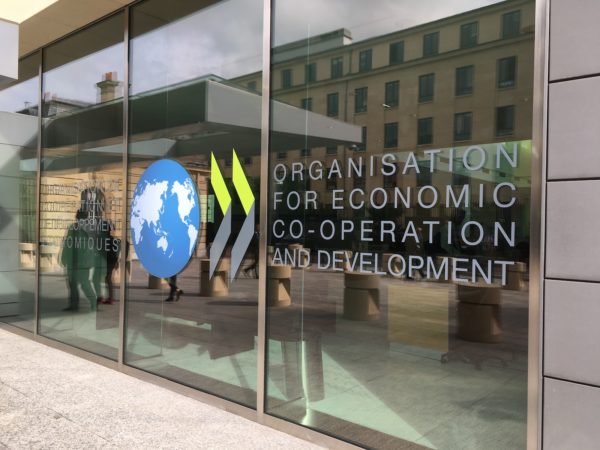Organisation for Economic Co-operation and Development (OECD) | National Contact Points (NCPs)
-
Overview
The Organisation for Economic Co-operation and Development (OECD) membership of industrialized nations host the majority of corporations and export credit agencies that finance and guarantee projects around the world. The OECD Guidelines for Multinational Enterprises are guidelines for corporations operating in and from OECD countries and include standards on human rights, labor, and the environment.
Organisation for Economic Co-operation and Development (OECD)
Created In: 1961
Headquarters: Paris, France
Member Countries: 38
Mission: To promote policies that will improve the economic and social wellbeing of people around the world.
The Accountability Office: National Contact Points (NCPs)
Established in: 2000
Functions: Dispute Resolution
In May 2011, adhering governments agreed to a new version of the OECD Guidelines for Multinational Enterprises. The guidelines, which were originally adopted in 1976 and first revised in 2000, cover standards for corporate behavior in the areas of human rights, information disclosure, employment and industrial relations, sustainable development and environment, combating bribery, consumer interests, science and technology, competition, and taxation. They apply to multinational enterprises that are based in and/or operating in OECD member countries. To learn more, please read the 2011 press release from our colleagues at OECD Watch, which outlines the changes in the 2011 version of the guidelines.
The Accountability Office
National Contact Points
Member governments and non-members that adhere to the OECD Declaration on International Investment and Multinational Enterprises (of which the guidelines are a component) are required to establish a national contact point (NCP). NCP functions include promoting the guidelines, handling enquiries, and facilitating the resolution of problems arising from the non-observance of the guidelines. In this last function, the NCP receives “specific instance” complaints and provides a mediation process for the complainants, often civil society organizations or labor unions, to reach a settlement with the multinational enterprise.
A complaint can be filed with the NCP in the country where the conduct occurred or where the corporation is headquartered. Typically, NCPs follow general procedures outlined by the OECD, but each NCP may also adopt different or more specific procedural rules.
The mediation process is entirely voluntary, and upon its conclusion or termination, the NCP will issue a statement and make the results publicly available. The NCP statement may also include recommendations on the implementation of the guidelines as appropriate.
To learn more, see our Accountability Resource Guide, visit OECD Watch’s website, or visit the OECD’s website.
Click here to learn about Accountability Counsel’s work with the U.S. NCP.
-
Our Advocacy
Accountability Counsel actively works to strengthen the OECD Guidelines for Multinational Enterprises and National Contact Points (NCPs) system so that they more effectively provide remedy to communities and individuals harmed by multinational enterprises.
Advocating for Updates to the OECD Guidelines
The OECD Guidelines have been a strong tool for promoting responsible business conduct and environmental, social, and human rights due diligence, but they are now due for an update to ensure alignment with other international normative and legal instruments. Developments since the Guidelines were last revised in 2011 include the 2030 UN Sustainable Development Goals, requirements for ESG- and human rights-based disclosures in reporting standards, and legislative initiatives to enforce due diligence.
The effectiveness of the Guidelines are largely contingent on the independence, resources, expertise, and political will of NCPs to promote the Guidelines to businesses and address complaints of harm stemming from violations of the Guidelines.
In February 2023, Accountability Counsel submitted comments to urge updating the Guidelines to maintain their relevance and improve their overall effectiveness in three critical ways:
- The duty to respond. MNEs must meaningfully respond to allegations of human rights, environmental, or social impacts raised through NCPs responsible for overseeing implementation of the Guidelines.
- Standardized NCP Functions and Practices. There must be clear baseline expectations for effective NCPs.
- Enhanced due diligence standards for MNEs marketing themselves as ESG/SDG/impact investors and operating in the space of privatized development finance. The OECD-UNDP Impact Standards for Financing Sustainable Development must guide these actors and NCP assessments.
NCP Peer Review Analysis
Conducted by representatives of two to four different NCPs, a peer review assesses the NCP under review and provides recommendations for the NCP to operate in a more accessible, transparent, and accountable manner. Ahead of the review of the U.S. NCP, we co-published an article with the International Labor Rights Forum and ICAR with specific arguments regarding some key outcomes the peer review should produce, especially the removal of the NCP’s strict confidentiality requirements for complainants.
Recognizing that NCPs can facilitate access to remedy in cases of corporate misconduct, the International Corporate Accountability Roundtable (ICAR), Accountability Counsel, and OECD Watch researched whether the peer review process is really improving the effectiveness of NCPs overall. Our qualitative research found that NCPs, as well as their stakeholders, generally found the peer review process to be beneficial. However, this research has found that there were important variations across peer reviews and that implementation of peer review recommendations has been incomplete and often ad-hoc, focusing on relatively easy fixes like promotion-related activities, rather than changes to more impactful issues, such as those related to institutional structure and the specific instance process. We look forward to the implementation of the recommendations contained in this report. In line with this advocacy, our partner OECD Watch issued a letter to the OECD Working Group on Responsible Business Conduct (WGRBC) and Investment Committee to ensure that they are making headway in the implementation of the 18 concrete recommendations issues in the Peer Review report. Doing so will ensure a robust peer review process moving forward and high-performing, effective NCPs.
OECD Watch
We are active participants in OECD Watch, an international network of civil society organizations promoting corporate accountability, as well as a former Coordination Committee member. Our work with OECD Watch includes monitoring and advocating for improved NCP performance and implementation of the guidelines. OECD Watch is currently engaged in its “Remedy is the Reason” campaign, which advocates for NCPs to provide more effective and reliable remedy to communities harmed by business-related human rights and environmental violations.
We support OECD Watch in urging OECD adherent governments to make the following reforms to their NCPs:
- Governments must explicitly recognize that the primary reason for the NCPs is to ensure access to remedy for victims.
- Governments should require NCPs to issue determinations of non-compliance or compliance with the Guidelines, as a measure to encourage companies to implement the Guidelines’ recommendations and participate meaningfully in the specific instance process.
- Governments should assign consequences for companies’ refusal to mediate in good faith or implement the NCP’s recommendations, or for companies’ failure to comply with the Guidelines. Consequences can include exclusion from trade promotion privileges, public procurement contracts, export credit guarantees, and investment missions.
- Governments should ensure their NCPs strike a meaningful balance between transparency and confidentiality that permits reasonable campaigning activities.
- Governments should ensure their NCPs are accessible to potential complainants by engaging in broad-based promotional activities with stakeholders, providing information on the specific instance process on their websites, and accepting cases that present a plausible claim and meet the admissibility criteria proposed in the Procedural Guidance.
- Governments should ensure that NCPs have an organizational structure conducive to impartial decision-making, such as a multi-partite structure involving various government agencies, a structure involving international experts and stakeholders, or a structure involving an oversight steering board.
- Governments must provide NCPs sufficient resources to accomplish their mandate, including to support indigent complainants in utilizing the complaint and mediation services.
- Governments should enhance the predictability of their NCPs by ensuring NCPs set and follow reasonable timelines for case processing, communicate regularly with both parties regarding the complaint status, and base their final statements only on material available to both parties.
- Governments should help NCPs to support the safety of activists using the mechanism, as they increasingly face threats for their engagement in claims on corporate misconduct.
- Governments must require NCPs to follow-up on case outcomes, and to encourage compliance with their recommendations and with the Guidelines
- Past Advocacy
-
Documents
Institutional Documents
2011 OECD Guidelines for Multinational Enterprises
2000 OECD Guidelines for Multinational Enterprises
Documents by Release Date
Feb 2023 – AC called for the updating of the OECD Guidelines to improve their effectiveness in promoting responsible business conduct.
Jun 2018 – Accountability Counsel, International Corporate Accountability Roundtable (ICAR), and OECD Watch published a report on the NCP Peer Review Process and its effectiveness.
Jul 2011 – Assistant Secretary of State Fernandez replied to the letter from Accountability Counsel, stating that the recommendations were considered and the new procedures and policies are consistent with them.
Jun 2011 – Accountability Counsel submitted a letter, endorsed by 10 other civil society organizations, to Assistant Secretary of State Fernandez, expressing concern about the new rules of procedure. Accountability Counsel included a detailed annex to the 23 June letter, endorsed by 10 other civil society organizations, analyzing the deficiencies in the new rules.
Jun 2011 – The State Department published revised rules of procedure governing the U.S. NCP, which failed to consider the consensus in comments from civil society on most issues.
Jan 2011 – The Advisory Committee on International Economic Policy (ACIEP), investment subcommittee, of which Accountability Counsel is an appointee, produced a report advising the State Department on reform of the U.S. NCP.
Nov 2010 – Accountability Counsel, and 14 other civil society organizations, submitted joint comments on the review of the NCPs.
Oct 2010 – Accountability Counsel submitted comments on the review of the NCPs.
Apr 2010 – The State Department published a brochure regarding how the NCP processes complaints, one day before a meeting with Accountability Counsel.
Apr 2010 – As part of the United Nations Human Rights Council Universal Periodic Review, Accountability Counsel submitted a report describing the urgency of OECD NCP reform.
Oct 2009 – Accountability Counsel submitted a joint letter to Secretary of State Clinton, urging reform of the U.S. NCP.
Oct 2009 – Accountability Counsel submitted a joint letter & memo to the OECD, calling for key reforms and the strengthening of the NCP.


